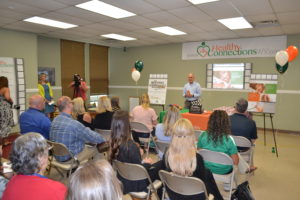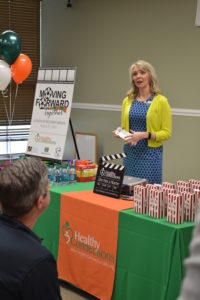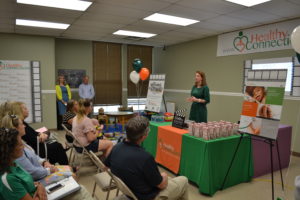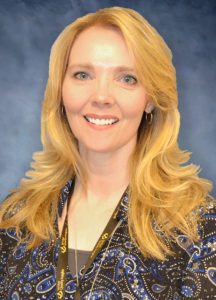By Crystal Welch, RN, MSN
It’s no secret that the nation’s opioid crisis is taking a heavy toll on our society and impacting people from all walks of life. But while negative headlines permeate media coverage, dedicated individuals and agencies are quietly stepping up to turn the tide of the epidemic right here in West Virginia. Sometimes branded as America’s drug death capital and the epicenter of the opioid epidemic, Huntington is also the birthplace of innovative solutions implemented by committed partners who are working together so people can achieve recovery from substance use disorder.

Building Healthy Connections
Healthy Connections is a coalition helping pregnant women, mothers and their families navigate the wide range of treatment and support services available in the community. Members are comprised of more than 30 agencies serving the Huntington area, including Marshall University’s Department of Psychology and Department of Social Work, Marshall Health, the Marshall University Joan C. Edwards School of Medicine, River Valley Child Development Services, Cabell Huntington Hospital, St. Mary’s Medical Center, Quality Insights, Valley Health Systems Inc., Cabell-Huntington Health Department, the West Virginia Department of Health and Human Resources, Lily’s Place, Recovery Point of West Virginia and the City of Huntington.
The coalition was founded in 2017 by Marshall Health Director of Addiction Services Bob Hansen, who is currently serving as the director of the State Office of Drug Control Policy, and former Marshall Health psychologist Louis Nieuwenhuizen as a response to the increased incidence of Neonatal Abstinence Syndrome (NAS) in the community. Over the past two years, the group has grown and secured grant funding to hire three trained social workers who serve as family navigators. The navigators work with a small caseload and develop a unique plan for each client and child to help guide them through the entire spectrum of resources. They also provide comprehensive assessments to identify needs and coordinate services, including connecting individuals with credentialed peer recovery coaches who improve present life conditions and help set future goals.
“Healthy Connections’ family navigators are the foundation of the group’s ability to provide wraparound services,” says Hansen. “The capability to shepherd those in need through so many agencies and services is very important to achieving long-term recovery.”
Developing Resources and Strategies

As with any new group, engaging the right people to affect change and developing a strategy to reach individuals in need of services are critical. To aid in this effort, Quality Insights, a Charleston-based nonprofit organization that brings people and information together to improve health nationwide, joined Healthy Connections in early 2018 and made a $1 million donation of in-kind services to help the group over three years. The relationship came to be thanks to the facilitation of West Virginia Senator Robert Plymale.
“When Quality Insights approached me to ask how they could help combat the opioid epidemic, I recognized the natural fit between Healthy Connections’ needs and their goals,” says Plymale. “It has been so gratifying to make the initial connection and watch the relationship flourish over the past year.”
Quality Insights’ in-kind services include developing and hosting Healthy Connections’ web and social media presences and launching an intensive outreach campaign to share Healthy Connections services, reduce substance use disorder stigma and measure the most effective strategies for reaching individuals with substance use disorder. To date, Healthy Connections has hosted several events alongside Quality Insights, including the first-annual All Walks of Recovery at Marshall University and Moving Forward Together, a workshop that served to kick-off Recovery Month 2018 with the premiere of a video short, “She Has a Name.”
Misty, the individual featured in “She Has a Name,” is a client of Healthy Connections’ family navigators based at the River Valley (RV) Center for Addiction Research Education and Support (CARES), located in the former Enterprise Child Development Center on the West End of Huntington. RV CARES is managed by River Valley Child Development Services, a Healthy Connections partner and local provider of early childhood care. RV CARES will begin offering specialized childcare services designed for children birth to two with neonatal exposure to substances soon. The site will ultimately serve as a training center for both child care providers and Marshall University students studying early childhood development, social work and psychology.
Healthy Connections also hosts a monthly Knowledge in Developmental Steps (KIDS) Clinic featuring a variety of Marshall Health medical specialists who come together to serve all of the developmental needs of children without needing a referral. The clinic assesses the physical and behavioral development of children with neonatal exposure through assessments by a pediatric neurologist, speech language pathologist, child psychiatrist, social worker, therapist and others. Beyond reducing referral and transportation barriers, the care provided for these children also presents data collection opportunities for research into the development of those with neonatal exposure from an infant to a young adult and determination of best practices for their care.
In 2014, Huntington became the first city in the U.S. to have a dedicated NAS center when Lily’s Place opened. Today, Lily’s Place is a key Healthy Connections partner and provides observational, therapeutic and pharmacological care to infants suffering from prenatal drug exposure in a facility designed to make them as comfortable as possible while going through the weaning process. Executive Director Rebecca Crowder serves as one of Healthy Connections’ co-chairs.
“It’s amazing to see so many members of one community bond with the common goal of helping those in need achieve long-term recovery,” says Crowder. “We are proud to see the progress made by both Healthy Connections and its clients and know that by sustaining our unity and efforts we can continue to drive improvement and positive change throughout the region.”

Reducing Negative Stigmas
Another Healthy Connections goal is to reduce stigma so health care providers, policymakers, the general public and those suffering from substance use disorder themselves recognize that addiction is a treatable disease and not a choice. Healthy Connections Co-chair Lyn O’Connell, Ph.D., is an expert on stigma reduction and has delivered workshops and presentations on the topic for more than 5,000 people throughout the state. As associate director of community services in the Department of Family and Community Health’s Division of Addiction Sciences at the Marshall University Joan C. Edwards School of Medicine and Marshall Health, she spreads the message of stigma reduction while ensuring structures are in place that encourage long-term recovery throughout the community.
“There are as many people devoting their lives to helping people with substance use disorder in Huntington as there are in other places across the state and nation,” says O’Connell. “I think what really sets us apart isn’t our rate of overdoses or number of infants born with neonatal exposure—it’s how quickly and seamlessly community members have come together through groups like Healthy Connections to turn things around. You don’t see that everywhere, and that’s why we are already starting to see improvements here in Huntington.”
While the opioid epidemic is far from over, its inevitable end will be due in large part to the tireless work of dedicated individuals, agencies and coalitions like Healthy Connections that believe teamwork and coordination will lead to positive change and serve as a model for other communities to help families affected by substance use disorder.
 About the Author
About the Author
Crystal Welch, RN, MSN joined the team at Quality Insights in 2013. As the lead project coordinator, she is responsible for executing all facets of the organization’s partnership with Healthy Connections and brings to the role more than 25 years of nursing leadership experience. Welch serves as the chair of the media/marketing workgroup and recording secretary for the steering committee, and she coordinates information technology and communications activities to ensure timely web updates and continuous material and message refinement for Healthy Connections. She also recruits and engages applicable stakeholders, executes partnership opportunities and serves as an organizational brand ambassador in multiple groups throughout the state. Welch is a lifelong resident of Huntington and earned her bachelor’s degree in nursing from Marshall University and master’s in nursing from Bellarmine University.








